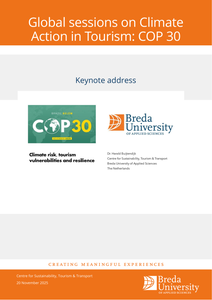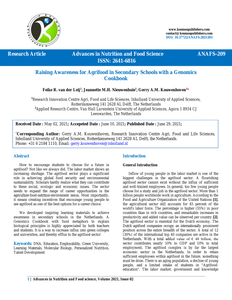DOCUMENT

Be energy future proof: - So, be energy future proof, you do now no how. - Include legislation in this but do not rely on legislation as a guide line. - Base your future-proof energy system on the trends and prepare for that. - But be aware: this ain’t easy.
DOCUMENT

Studenten en bedrijfsleven roepen het hoger onderwijs op duurzaamheid prominent in het curriculum op te nemen. Dit artikel is een verkenning van de raakvlakken tussen economie en duurzaamheid met als doel thema’s te benoemen die in het curriculum van de opleidingen bedrijfseconomie en accountancy aan bod zouden kunnen komen. Er wordt eerst stilgestaan bij een beschrijving van de op ons afkomende problemen zoals klimaatverandering, grondstoffenschaarste en verlies aan biodiversiteit. Vervolgens wordt geschetst voor welke uitdagingen het bedrijfsleven staat en worden ontwikkelingen geschetst op macro-, meso- en microniveau. Afsluitend volgen suggesties voor op te nemen thema’s in het curriculum van de bedrijfseconomische en accountancy opleiding, zoals bijvoorbeeld een verdieping in de bestudering van verdelingsmechanismen (markt versus overheid), verbreding van het kostenbegrip, strategisch risicomanagement dat rekening houdt met duurzaamheid, duurzaamheidsverslaggeving en ketenmanagement. Het tot stand brengen van een duurzame economie vraagt daarnaast om buiten bestaande denkkaders te treden.
DOCUMENT

How to encourage students to choose for a future in agrifood? Not like we always did. The labor market shows an increasing shortage. The agrifood sector plays a significant role in achieving global food security and environmental sustainability. Scholars hardly realize what they can contribute to these social, ecologic and economic issues. The sector needs to expand the range of career opportunities in the agriculture-food-nutrition-environment nexus. Most importantly, it means creating incentives that encourage young people to see agrifood as one of the best options for a career choice.Inspiring learning materials have been developed to achieve awareness in secondary schools in the Netherlands. A Genomics Cookbook with food metaphors to explain biological principles is highly appreciated by both teachers and students. It is a way to increase influx into green colleges and universities, and thereby efflux to the agrifood sector.
DOCUMENT

How to encourage students to choose for a future in agrifood? Not like we always did. The labor market shows an increasing shortage. The agrifood sector plays a significant role in achieving global food security and environmental sustainability. Scholars hardly realize what they can contribute to these social, ecologic and economic issues. The sector needs to expand the range of career opportunities in the agriculture-food-nutrition-environment nexus. Most importantly, it means creating incentives that encourage young people to see agrifood as one of the best options for a career choice. We developed inspiring learning materials to achieve awareness in secondary schools in the Netherlands. A Genomics Cookbook with food metaphors to explain biological principles is highly appreciated by both teachers and students. It is a way to increase influx into green colleges and universities, and thereby efflux to the agrifood sector.
MULTIFILE

Technische, economische en maatschappelijke aspecten van duurzame waterstof.Dit rapport is geschreven als achtergrondinformatie voor twee projecten waarbij de Hanzehogeschool Groningen betrokken is: de bouw van een waterstoftankstation in Groningen en deontwikkeling van een waterstofwoonwijk in Hoogeveen. Het waterstoftankstation is in november 2021 feestelijk geopend en de waterstofwijk is nog volop in ontwikkeling.Beide projecten dragen bij aan de realisatie van een klimaatneutrale toekomst. Nederland wil in 2050 klimaatneutraal is zijn, met andere woorden: er mag netto geen uitstoot meer zijn van broeikasgassen. Hierdoor wordt de opwarming van de aarde beperkt en worden ongewenste klimaatveranderingen voorkomen.Het rapport gaat over de rol die waterstof kan spelen in de transitie van fossiele energie naar duurzame energie.
DOCUMENT

Traditionally the construction industry in New Zealand and in other countries has seen a low productivity and a low track record for successful sustainable innovations. This has a negative impact on private and government spending, on quality and on health and environmental aspects. This research proposal posits that the construction industry needs disruptive (discontinuous, radical) technology innovations to be able to make drastic improvements. Such innovations often come from entrepreneurial small firms from outside the industry or at the beginning of supply chains and must be procured and adopted into such chains. This PhD proposal focuses on procurement activities of such firms in the New Zealand construction industry when they conduct disruptive waste-reducing innovations. These procurement activities must be aligned with (internal and external) innovation activities for an optimal firm performance. This performance is moderated by four clusters of internal and external variables.
DOCUMENT
